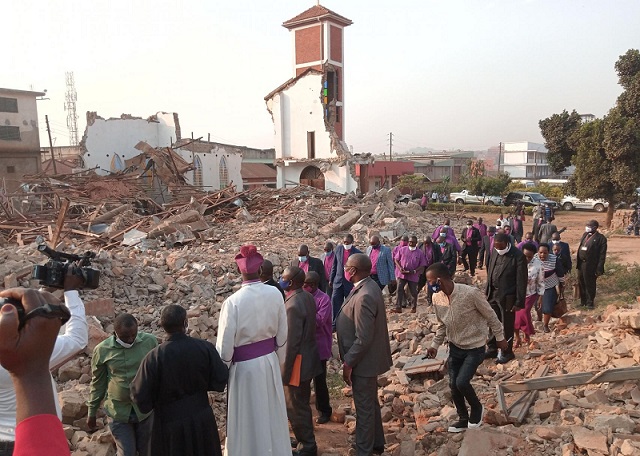
Kampala, Uganda | THE INDEPENDENT | The demolition of St. Peter’s Ndeeba church building in Kampala followed the due process of law, the Anti-Corruption Court heard Wednesday from Anita Kusiima, the Kampala Capital City Authority-KCCA physical planning supervisor.
Kusiima had appeared as a state witness to pin businessman Dodovico Mwanje for allegedly obtaining a demolition permit unlawfully, which the police officers and bailiffs enforced to bring down the 40-year-old church building in 2020.
In her testimony before the court, Kusiima noted that by the time the church structure was demolished, the Ministry of Works and Transport had issued regulations shifting the duty of giving out building, demolition, and related permits from the directorate of physical planning to engineering, in accordance with the then-recently enacted Building Control Act.
“The ministry (of works) sent the new guidelines and regulations outlining adjustments. The said regulations were sent around June or July 2020. They said the engineering department would issue all permits connected to construction, and the two directorates were to be restructured as per the new law,” Kusiima said.
Kusiima also noted that as a supervisor, she never handled any application for demolition but rather learned the matter from the widely spread news stories. She explained that in the ideal situation, the application could have been forwarded to her office from the reception. She would then assign an inspector to visit the place and write a report.
“I learned this from the news. When I saw the news I quickly called Richard Naika, the Rubaga building inspector who told me that there was a (demolition) permit issued by the director of Physical Planning, Ivan Katongole,” she added.
Katongole was charged with abuse of office. However, Kusiima could not stick to this narrative when Ambrose Tebyasa, one of the accused’s lawyers started questioning her about the processes through which one gets a permit. First, Tebyasa rebutted Kusiima’s claim on building control when he informed the court that the law was operationalized in October two months after the church demolition.
“The building control act was operationalized in October this means that by August when the permit was issued, the physical planner’s office was still conducting business under the Physical Planning Act given the fact that it had not been repealed,” the lawyer told the court. The witness later confirmed the lawyer’s statement.
After being pressed further, the witness testified that she had discovered while looking through the records after the destruction of the church building, that Ephraim enterprises had applied for a demolition permit, and an inspection that recommended the issuance of the permit had been carried out.
The court also learned that a redevelopment plan for plot 39 Block 7, Ndeeba Lubaga Division that was submitted by Ephraim enterprises had been approved by an 11-member Physical Planning Committee chaired by then-KCCA Acting Executive Director, Eng Andrew Kitaka before the issuance of a demolition permit.
Kusiima also pointed out the committee had given the landowner permission to set up a commercial building in the area. “Of course, this was done after establishing that the applicant was the truly registered owner of the property at that time,” she stressed while answering a question on the process that led to the approval of a development plan.
It should be noted that prior to the KCCA proceedings, the High Court Land Division had issued a verdict in July 2019 finding that the subject property was in the vested interest of the late Evelyn (Evarini) Nachwa who later sold the property to Ephraim businesses through Nachwa estate.
In July 2020, Justice Eudes Keitirima also authorized the demolition. “How could Ephraim enterprises execute the development plan without demolishing the existing structure?“ Tebyasa asked. Kusiima explained that this could only be done by acquiring a demolition permit from KCCA, which she noted was issued.
Maxim Mutabingwa, the lawyer for Ivan Katongole, also wondered why his client was arrested and charged based on a decision that came out of a process. “Mr. Katongole issued a permit after following a due process?” Mutabingwa asked Kusiima who replied in the affirmative. When pressed further, Kusiima also acknowledged that Katongole, as a technical person, could only issue a permit based on a report from the inspector, which is usually availed to him with a recommendation.
After Kasiima’s testimony, the court adjoined the matter to August 9 when the prosecution is expected to present another witness. However, Anti-corruption Court Chief Magistrate Joan Aciro advised the state attorney to bring more than one witness at a time to ensure a speedy trial.
“The state should devise means so that we get more than one witness a day. I think it is possible. For instance, today, we had more time, you brought one witness,” she told the prosecutors. The court also issued criminal summons to the sureties of ASP Isabirye Kaloli, the former Field Force Unit (FFU) Commander KMP/South Region whose whereabouts are currently unknown.
Following the demolition, the Anti-Corruption Unit under Col. Edith Nakalema swung into action and arrested nearly everyone who was involved in the matter. Later, Dodovico Mwanje and several others including five police officers, a Gombolola Internal Security Officer, and Ivan Katongole, KCCA physical planner were charged.
According to court records, Mwanje is accused of the theft of assorted Church properties valued at Shillings 850 million, the six police officers and the GISO are accused of abuse of office, corruption, conspiracy to commit a misdemeanor, and disobeying lawful orders.
Besides these criminal charges, Mwanje is also battling a civil case over the ownership of the land that hosts the church. Recently, the Principal Judge Dr. Flavian Zeija set aside a judgment that was based on to sale the contested land to Mwanje and ordered a retrial.
*****
URN
 The Independent Uganda: You get the Truth we Pay the Price
The Independent Uganda: You get the Truth we Pay the Price



